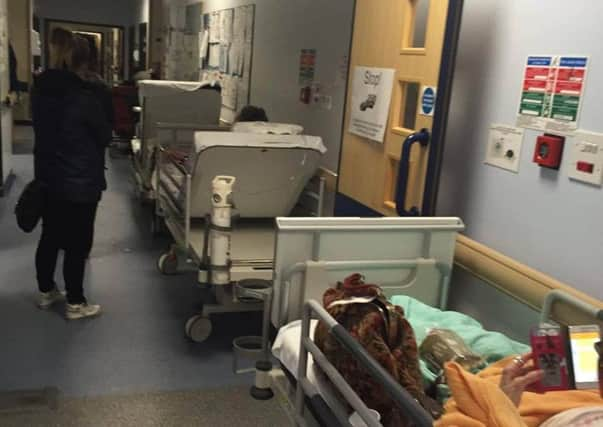GPs drafted into hospital as NHS nears '˜tipping point'


NHS North Lincolnshire clinical commissioning group (CCG) officials have been trying to relieve pressure on Scunthorpe General Hospital, which they said is “facing unprecedented demand” on services, with patients “experiencing extremely long A&E waits”.
Meanwhile, in Leicestershire, the CCG said patients may be discharged to”’unexpected” settings, including being sent home to be cared for by loved ones.
Advertisement
Hide AdAdvertisement
Hide AdStephen Dalton, chief executive of the NHS Confederation, said: “Pressure on A&E departments is being caused by a lack of funding in primary, community, mental health and social care.
“Health and care staff on the front line are working harder than ever this winter and are continuing to ‘just about cope’, but this is simply not sustainable.
“We have been issuing warnings of the system approaching a tipping point for some time, but we are now starting to see proof that this point has been reached. The Government must accept that limited investment at a time of increased demand has consequences.
Earlier this week, Health Secretary Jeremy Hunt said NHS trusts in distress could ask GPs to free up some time to help them discharge and care for patients.
Advertisement
Hide AdAdvertisement
Hide AdThe news comes as new data from November shows a health system under strain as it got ready to enter its busiest time ever over Christmas.
The data for England highlights acute problems with delayed discharges - where patients are medically fit to leave hospital but are stuck in beds due to problems arranging care in the community.
This impacts on A&E as hospitals struggle to find beds for incoming patients.
Days lost to delayed transfers of care totalled 193,680 in November. This is the third highest number on record, and 26% higher than the figure for November 2015.
Advertisement
Hide AdAdvertisement
Hide AdMatthew Swindells, NHS England’s national director for operations and information, said: “This month’s figures show a 42% annual increase in delays in being able to discharge patients as a result of pressures in social care.
“Hospitals report this affects their ability to quickly admit emergency A&E patients, so the NHS is working closely with local councils and community health services to enable older patients to get the support they need after a hospital stay, back at home.”
The figures also show trolley waits of over four hours after a decision has been made to admit the patient totalled 52,769, the second highest figure on record, and 54% higher than November 2015.
Trolley waits of over 12 hours totalled 456 - again, the second highest figure on record. This is 16 times higher than the number for November 2015.
Advertisement
Hide AdAdvertisement
Hide AdThe proportion of people seen at A&E within four hours in November was 88.4%, against a 95% target. Last November it was 91.3%. November’s figure of 88.4% is the lowest since March 2016 (87.3%).
Some 88% of calls to NHS 111 were answered within 60 seconds - down from 90% in November 2015.
The call for help from GPs in the Midlands, seen by Pulse magazine, was put out this week.
The CCG emailed practices asking them “whether a member of the senior clinical team could be mobilised to attend the hospital to review and potentially support the discharge of a small number of patients.
Advertisement
Hide AdAdvertisement
Hide Ad“These patients will require medical oversight and support in the community which will need to be provided by their own practice.”
The CCG said it was “also looking at whether we can discharge patients to additionally commissioned community beds and we will be looking to secure enhanced GP and nursing cover for those beds” and that “we will approach practices separately regarding this when available beds have been identified”.
Dr Andrew Green, chair of the British Medical Association’s GP committee clinical and prescribing subcommittee, said the request was “incredible”.
He told Pulse: “Patients rarely have discharges delayed due to a lack of a medical opinion, it is usually due to factors such as social care, or the provision of discharge medication.
Advertisement
Hide AdAdvertisement
Hide Ad“These vital services must not be overlooked in what appears to be a panic reaction to a bed shortage, which once again illustrates the point that nobody believes that general practice is also in a workforce and workload crisis.”
An NHS North Lincolnshire CCG spokesman said “as is the case with hospitals in many parts of the UK this week, our local acute hospital is currently experiencing significant bed pressures.
“The CCG recognises that primary care is also experiencing extreme pressures but a system wide response has been necessary this week to ensure patient safety.”
Earlier, former Tory health secretary Stephen Dorrell hit out at the “unfair” criticism of the boss of NHS England reportedly meted out by Theresa May’s senior aides amid the growing crisis in the health service.
Advertisement
Hide AdAdvertisement
Hide AdNHS chief executive Simon Stevens went against the Prime Minister over the state of NHS funding by telling MPs it is “stretching it” to say it got more money than it asked for.
He said an extra £10 billion was being made available to NHS England over the course of six years but overall the health service had “got less” than set out in its five-year plan.
The comments contradict those of Mrs May, who has insisted the NHS got all it wanted in the funding settlement.
Mrs May’s official spokeswoman said the Prime Minister had “full confidence” in Mr Stevens.